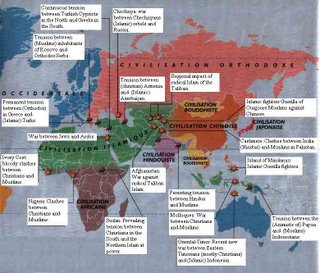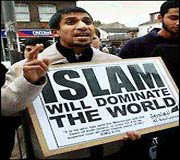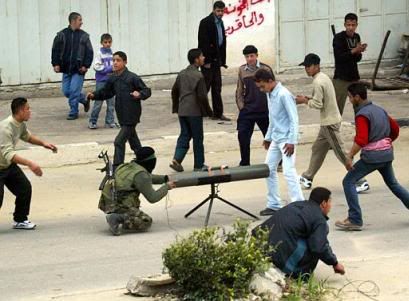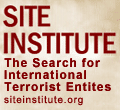Wednesday, March 14, 2007
The Myth of Moderate Mullahs It's still Khomeini's Iran
http://www.weeklystandard.com/Content/Public/Articles/000/000/013/401lsgzo.asp
If the Reagan administration had learned in 1987 that the clerical regime in Tehran was doing what it is doing today, would Washington have approved of preventive strikes on Iranian nuclear facilities? If Reagan and company had seen Ayatollah Ruhollah Khomeini rapidly constructing uranium-enrichment centrifuges in underground facilities, pushing doggedly ahead on heavy-water research and a plutonium-making nuclear reactor, and spending profusely on the development of long-range intercontinental ballistic missiles that are effective weapons only if topped with WMD warheads, would more of the U.S. foreign-policy establishment have urged our European allies to support severe sanctions to dissuade the mullahs from developing the bomb? Would leading members of the Democratic party, who then controlled the House and the Senate, have been sympathetic to a military response to the mullahs' nuclear ambitions, or would they have argued for another round of engagement, quickly forgetting their disparagement of the White House's and the CIA's 1985 search for bribable "moderates" in a terrorist-supporting state with American blood on its hands?
Even with the Cold War fear of Soviet reactions, Reagan might well have ordered a strike by the United States--probably with the encouragement of his secretary of state, George Shultz, the most farsighted official ever about the dangers of terrorism, and a man not averse to using force in international affairs. The odds are good that many Democrats in Congress would have applauded any aggressive decision--with or without accompanying protests about neglect of the War Powers Act and Congress's monopoly on declarations of war. The
Western Europeans might have expressed their dismay at American cowboyism, although the criticism might have been short-lived since the clerical regime then was regularly unleashing terrorism in Europe. Twenty years ago the Western Europeans had not so fully entered their post-Kantian world where soft power always trumps hard. Also, the French and the Germans were massively invested in Iraq, then at war with Iran. The Soviets, of course, would have been furious, their distaste for American unilateralism checked somewhat by their concern for Saddam Hussein. The U.S. ambassador at the United Nations, Vernon Walters, would no doubt have had to live through a public excoriation of Reagan's America as a lawless, aggressive, third-world-thumping rogue state.
Things are obviously different now, primarily because the Islamic Republic has changed. One could see the changes beginning in the 1980s, as the wreckage of the Iran-Iraq war was slowly dissolving the violent love affair that young Iranian Shiite males had had with God and the charismatic Ayatollah Ruhollah Khomeini. But back then it was too early to tell how losing the war would play out on the clerical elite.
For those who believe in "diplomacy first, diplomacy only" for dealing with the mullahs' quest for nuclear weaponry, the perceived changes in the Islamic Republic are what make the dovish case compelling. Khomeini with a nuke, even more than Saddam with atomic weapons, would have been just too unsettling for us to have reposed our confidence in the theory of deterrence. But in 2007, Ali Khamenei, the clerical leader of Iran, his president, Mahmoud Ahmadinejad, and Ali Akbar Hashemi Rafsanjani, the most politically adept mullah of the revolution, seem somehow less threatening, allowing many to accept what would have been unacceptable 20 years ago. Together, they just don't have the right mix of charisma, white-hot faith, unpredictable power, and history to make us, and Iranians, tremble the way we all did with the Imam. If Ahmadinejad were the sole ruler of Iran, then American and Israeli fighter-bombers probably would have already annihilated the principal nuclear sites--even with American soldiers in harm's way in Iraq and Afghanistan. Tied to the other two men, and to the disputatious clerical elite below them, Ahmadinejad just isn't perceived by many (outside of Israel) as a sufficient threat.
Technorati - Freedom 911 Al Qaida Al Qaeda Al Qaida Bin Laden Al Zarqawi Anti west Anti American Intolerance Terrorist oganization Hamas 'palestinian' propaganda Al Aqsa Alaqsa 'palestinian' terrorism Suicide bombing Saddam Hussein Torture chambers WTC bombing Homicide bombing London bombing Bali bombing Beheading Abu Sayyaf Honor killing Muslim clerics Mullahs Islamic Hitler Iran Regime Ahmedinejad Iran nukes Human rights War on terror jihad Sudan genocide Islamic slavery Arab slaver masters Genocide bombing Anti Israel bias Arab racism Anti Israel racism Islamofacsism Conflict Israel Islamic Jihad Hamas "palestinian" Animalism "palestinian" cruelty "palestinian" Savagery "Palestine" "Palestinians" Israelis Jewish refugees Victims of terror Moderates Islam Radical Islam Militants Arab occupation Arab Muslims Indoctrination Arab hatred Muslim hatred 'Palestinian' hatred 'Palestinian' Child abuse Jewish refugeesDeath cult 'Palestinian' human shields 'Palestinian' human bombs Arab oil lobby Arab oil mafia Islamic Aparthied Ethnic cleansing Passover massacre MuslimArabsArab atrocities Damour massacre Hebron massacre Politically correct Muhammad "palestinian" propaganda "Palestinians" Netanya massacre Hamas Abu Sayaaf Beheading Honor killing Jerusalem massacre Passover massacreBus bombing Islamists Mufti Koran Quran Radical Islam Islam Islamophobia Beslan massacre CAIR Islamic phobia Sharia Fatwa Mullah Kafir Infidels Islamofascism Islamic fascism Whabbism Whabbist Wahabbi Saudi Arabia Islamofacism "religion of peace" Huzbullah Arabism Apes & pigs Ahmadinejad Islamic Hitler EurabiaHuman shields ]
Labels: ahmadinejad, Iran, islam, islamic Hitler, islamofascism, Khomeini, moderates, Mullahcracy, Mullahs, muslims, myth, religion of peace

































